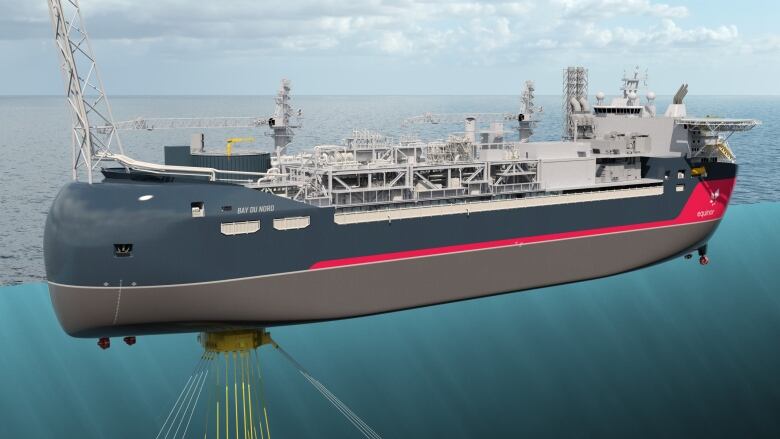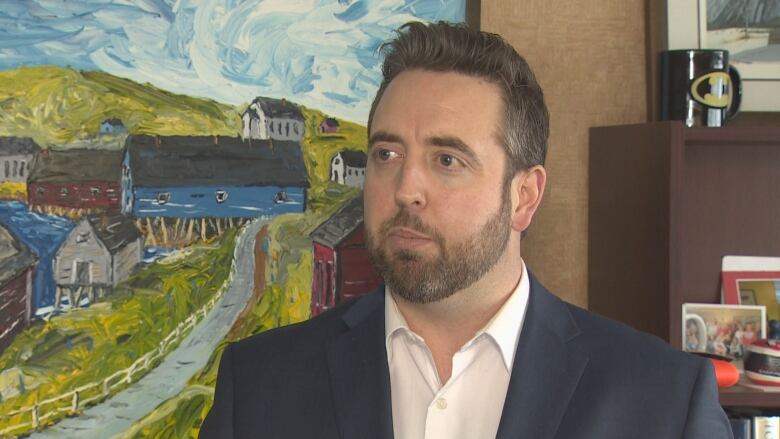N.L. oil and gas still has a future following release of federal emissions plan, minister says
Plan aims to cut greenhouse gas emissions 40% by 2030

Officials in Newfoundland and Labrador's oil and gas industry say the federal government's plan to dramatically curb greenhouse gas emissions by 2030 is an ambitious one, but the sector still has a future in the province.
The federal plan, announced by Prime Minister Justin Trudeau on Tuesday, leans heavily oncuts to theelectricity, oil and gas and transportation sectors in the hopes of cutting emissions by at least 40 per cent by 2030.
The plan also includes nearly $2 billion for so-called "futures funds" in Alberta, Saskatchewan, and Newfoundland and Labrador to "help workers across sectors upgrade or gain new skills to be on the leading edge of the zero carbon industry."
Although the plan is centred on cutting emissions andinefficient fossil fuel subsidies in the coming years, Newfoundland and Labrador Energy Minister Andrew Parsons said it was important for the federal government to recognize the need for oil made with lower carbon emissions.
"When you look at the carbon intensity of the oil and gas here, we average about 14.4 kilograms per barrel. Internationally, the average is 17.9. If you look at Alberta, it's 77. So we're already doing really good when it comes to the product here," Parsons told CBC News on Wednesday.
He and other members of the industry point to the proposed Bay du Nordoffshoreoil project, located 500 kilometres off St. John's in the Flemish Pass, as a project that could be a world leader in low-carbonoil. A decision to move the project forward has yet to be made by federal Environment MinisterSteven Guilbeault.
If the project produces oil, whichNorwegian oil giant Equinorsay could happen by 2028, Parsons said the carbon intensity onproduction would be around eight kilograms per barrel.

"Bay du Nord is absolutely the product and the operation that this country needs," he said. "If we stop doing it here, then all we're doing is opening the market to less rigorousproducts around the world. We're not making the situation any better by excluding ourselves from it. That being said, what's going to be done here will be a national leader."
In a statement to CBC News, Equinor said it supports the call from the federal government to reach net zero emissions by 2050, saying Bay du Nord has the potential to produce some of the lowest carbon oil in the world.
References to low-carbon oil refer only to the emissions created during extraction. Aswith all oil, the majority of emissions occur during refiningand combustion.
TheOil and Gas Corporation of Newfoundland and Labrador echoed the idea, saying it can help meet emission targets while meeting the demand for oil.
We have an opportunity in Newfoundland and Labradorto be global leaders.- Charlene Johnson
Energy N.L. CEOCharlene Johnson called the plan ambitiousbut said members of the province's industry are equally ambitious when it comes to reducing emissions.
"When you look atwhere the federal government wants to be by 2030 for the oil sector, we're already there in Newfoundland and Labrador," Johnson said. "And no doubt we are going to work towardcontinuing to lower that already low-carbon oil and we're going to be working on other things like renewables."

Johnson said the group, formerly known as the Newfoundland and Labrador Oil and Gas Industries Association, is confident the industry can be net zero before 2050, while adding the province can look forward to more oil and gas projects offshore if the Bay du Nord project moves forward.
"As long as the world is demanding oil, it should come from a place where it is low carbon," she said."We have an opportunity in Newfoundland and Labradorto be global leaders. Canada can be global leaders."
The province also hopes to explore different energy avenues such as hydrogen, wind and carbon-capture methods in the future, according to both Johnson and Parsons.
Plan shows Bay du Nord should be rejected: Sierra Club
But one environmental advocacy group says the federal government's plan is a sign the Bay du Nord project needs to be rejected.
"We're already set to blow right past our climate targets," saidHeather Elliott of the Sierra Club Canada Foundation, a grassroots non-profit organization committed to protecting theenvironment and creating a sustainable and environmentally sound ecosystem.
"In this report they did say that Canadians do not want more oil and gas expansion. We don't need the oil. So I think when it comes to Bay du Nord, based on what we heard yesterday, it's a no-brainer that the project should be rejected."

At the end of the day, Elliott said, low-carbon oil is still oil.
"It doesn't matter how much carbon it takes to get it out of the ground. It still gets shipped, transported, refined and burned. And that carbon is still released into the atmosphere."
Parsons said he has other priorities to focus on than the Sierra Club Foundation's stance on the project.
"That's good for them. They are not on my radar in terms of what I'm worried about now," he said. "We'll continue on. We're very happy with the efforts we've put forward to show that this is a project that's necessary."
With files from Terry Roberts












_(720p).jpg)


 OFFICIAL HD MUSIC VIDEO.jpg)
.jpg)



























































































